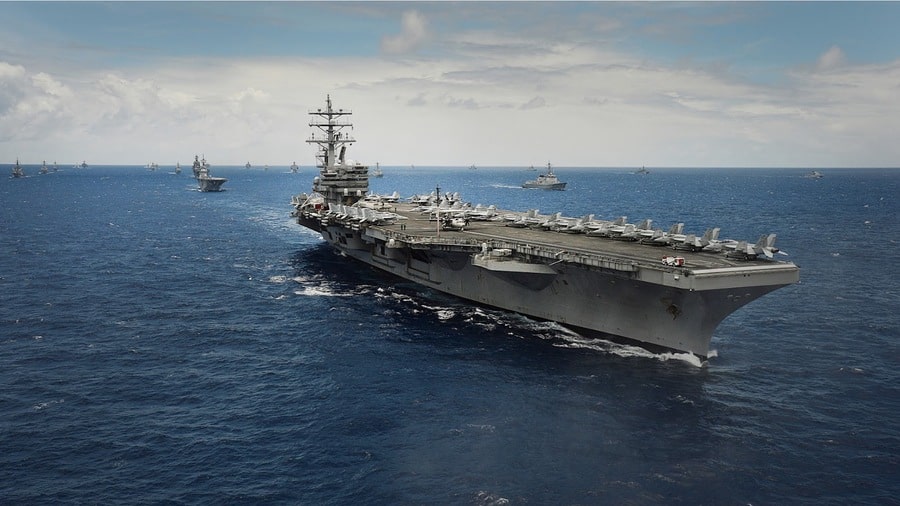In this article, Dr. William J. Parker III and Michael Jasny discuss
”Sound Pollution Threatens Marine Life and Maritime Security, Urging Collaboration for Solutions.”
Undersea noise pollution puts ships, sailors and marine wildlife in danger. EastWest Institute COO William J. Parker III and NRDC Marine Mammal Protection Project Director Michael Jasny explain how the U.S. Navy can help in a piece for the Richmond Times-Dispatch.
For years, environmentalists and the U.S. Navy have clashed over the issue of noise in the ocean, arguing repeatedly in court over naval sonar training and its impact on marine mammals. Yet undersea noise is an issue on which the two sides can also find common cause.
For marine animals, sound is life. Whales, dolphins, and many species of fish use it to forage, to find mates, to maintain their social bonds, and to navigate and orient themselves in the sea. But few aspects of the marine environment have changed as drastically in as short a time.
In much of the northern hemisphere, background noise has risen by orders of magnitude since the 1950s due in large part to commercial shipping. Its near-ubiquitous rumble, together with industrial noise, has been shown to destroy communication, compromise foraging, increase stress, and reduce the resilience of animals in the wild. The great oceanographer Sylvia
Earle has characterized this constant degradation of life at sea as “a death of a thousand cuts.”
It’s not only wildlife that’s at risk. The same undersea racket that threatens marine species also threatens the security of our ships and sailors. Off Asia, in the Persian Gulf — wherever they are deployed — commanders must keep a steady watch for signs of submarines and undersea hazards, using sonar systems that were inspired in part by the echolocation of dolphins and whales.
Unfortunately, just as noise pollution is destroying the whale’s ability to hear, it has degraded the mariner’s ability to detect, localize, and track objects in the water. All that background clutter, what biologists have called “acoustic smog,” has created a dangerous space for quiet diesel-electric submarines to hide.
***
These days, some 90 percent of the world’s goods are transported by ships across the maritime commons — more than 50,000 bulk carriers, cargo ships, tankers, and container vessels in all. And with trade increasingly by almost 3.5 percent annually, the noise problem is getting worse.
Ironically, the U.S. Navy has spent years quieting its own ships. Its Stewards of the Sea and Great Green Fleet programs are among the latest in a line of initiatives aimed at both reducing noise and boosting fuel efficiency.
The Navy has introduced stern flaps, adopted new hull forms that include bulbous bows and catamaran-shaped hulls, and made substantial efforts to reduce the noise of propeller cavitation. And yet, while its fleet undoubtedly remains the most powerful in the world, the Navy’s combat ships make up fewer than 300 of the tens of thousands of large vessels in use today.
In 2014, the International Maritime Organization, the global agency charged with controlling ship pollution, finally issued guidelines to curb ocean noise from large commercial vessels. It was an important first step, but the guidelines are voluntary and non-prescriptive, and the industry has been slow to begin implementing them.
***
The Navy could do more to help quiet the commercial fleet without risking its tactical advantage. It could partner closely with forward-looking shipping companies, on its own or through the National Oceanographic Partnership Program, to measure the sound loss and efficiency gain of various quieting technologies for commercial ships — nuts-and-bolts information that is sorely lacking. And it could review its own quieting technologies with a view to declassifying those that no longer require restriction.
The Navy has been in the ship-quieting business for decades, and even some of its older approaches to noise reduction could hold substantial benefits for the commercial sector.
While ocean noise has continued to grow, so has our understanding of where this pollution originates and how to reverse the negative trend. The oceans community must work together, and in this the U.S. Navy has much to offer and much to gain. Quieting ships will result in a less vulnerable Navy, a more resilient ocean, and a more efficient commercial fleet: a win, win, win.
What are we waiting for?
William J. Parker III is the chief operating officer at the EastWest Institute and a retired senior naval officer. Michael Jasny is director of NRDC’s Marine Mammal Protection Project and an expert in the law and policy of ocean noise pollution. Both appear in the new NRDC and Discovery Channel documentary film, “Sonic Sea,” which is now airing on Discovery.com and Discovery Go.




